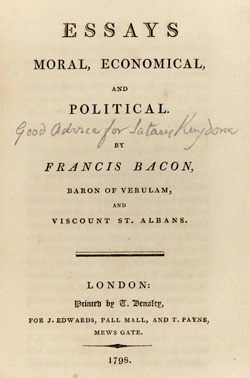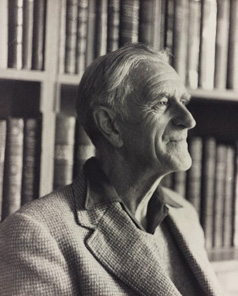A Workman's Tools: Sir Geoffrey Keynes

‘Good Advice for Satan’s Kingdom’: the title-page of Francis Bacon’s Essays Moral, Economical, and Political (London, 1798) annotated by the poet William Blake. Keynes.U.4.20.
In a catalogue of his library published in 1964, Geoffrey Keynes (1887–1982) emphasised its principal function: far from being ‘a random collection of books’, it was instead ‘a workshop furnished with the tools needed for the fabrication of the bibliographies that bear my name’. Keynes, a distinguished surgeon and scholar, was a dedicated and influential bibliographer; he produced descriptions of the publications of writers as diverse as Jane Austen, William Blake, Rupert Brooke, Sir Thomas Browne, John Donne, William Harvey and Siegfried Sassoon, and amassed excellent selections of his subjects’ printed works, most of which came to the University Library after his death.
Keynes was unable ‘to regard books as a watertight compartment in the whole range of the creations of the human intellect and imagination’, and included manuscripts, letters, prints, pictures and sculptures in his catalogue. The current display emphasises the manuscript element of his collection, and in particular items accrued through his friendships with authors of his own time.

Sir Geoffrey Keynes, photographed in 1953. From MS Add. 8633.
Many of the most significant items in Keynes’s collection came to him through association, rather than purchase, and throughout his life his circle of friends and correspondents heavily influenced his interests. Keynes entered Rugby School in the same term and the same house as the poet Rupert Brooke, and their friendship lasted until Brooke’s early death in 1915, after which Keynes appointed himself as guardian and protector of his friend’s work and reputation.
It does not always happen that a poet has a recording angel at hand in the shape of a bibliographical friend from the very beginning of his literary career. For Rupert Brooke this was provided … I was … privileged to be one of his friends, and to be a humble and admiring participator in his literary adventures. Though I was not … a conscious bibliographer … I immediately became a sort of press-cutting agency for Brooke’s work. (Geoffrey Keynes, 1959)











